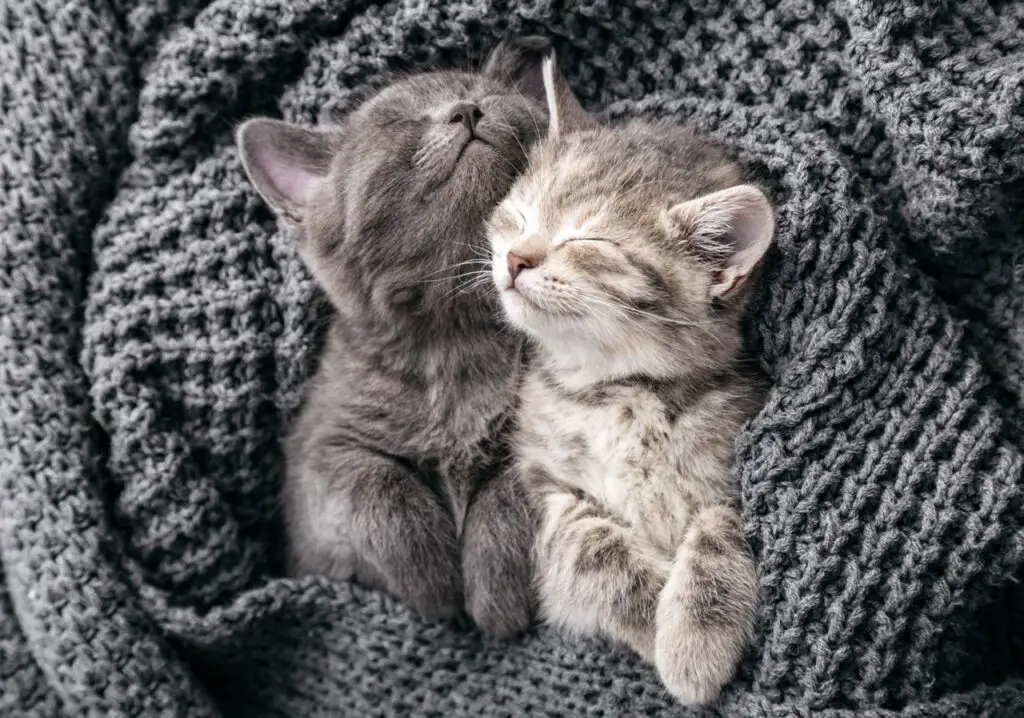9 Reasons to Adopt a Bonded Pair of Kittens or Cats
When people ask me if they should get one or two cats, my answer is easy: If you can afford it and have the space, adopt a bonded pair of kittens.
If you want to do the most good, you don’t have to wait for kitten season…
- look for “less-adoptable” cats
- adopt two adult cats because they typically take a lot longer than kittens to get adopted, and being in the shelter is stressful
- or adopt more than two, because there are far more cats in shelters than there are homes for them
Now here are our 9 reasons why bringing home two together is often better than adopting just one.

1. Natural Development and Socialization
Kittens learn crucial social skills from their siblings. When adopted together, they continue to:
- Develop proper bite inhibition through play
- Learn appropriate social boundaries
- Build confidence through mutual support
- Master their cat communication skills
2. Built-in Entertainment System
A bonded pair provides endless entertainment, both for themselves and for you:
- Chase games and wrestling matches
- Tag team acrobatics
- Stealth ambush
- Synchronized zoomies
- Complex play scenarios you’ll never tire of watching
3. Emotional Support Network
Cats are more social than many people realize. Two can provide each other:
- Mutual comfort during stressful situations like moves or vet visits
- Company during long workdays
- Shared warmth and security while sleeping
- Built-in cuddle buddy for life
4. Grooming Benefits
Having a feline grooming partner has benefits:
- Help reaching tricky spots like ears and neck
- Reduced likelihood of matted fur
- Lower risk of skin problems
- Natural stress relief through social grooming
5. Double the Heart-Melting Moments
You’ll witness countless adorable interactions:
- Napping and cuddling in impossibly cute positions
- Coordinated window-watching
- Tag-team mischief making
6. Practical Advantages
Beyond the emotional benefits, there are practical reasons too:
- Shared toys and equipment (one cat tree serves both)
- Similar feeding schedules
- Comparable veterinary timing makes tracking needs and schedules easy
- May be just a small difference in adoption fees
7. Lower Risk of Behavior Issues
Single kittens more commonly develop:
- Excessive neediness
- Play aggression toward humans
- Nighttime activity that disrupts sleep
- Stress-related behaviors like overgrooming
8. Long-Term Benefits
The advantages continue into adulthood:
- Lifelong companionship
- Shared territorial confidence
- Mutual exercise motivation
- Built-in stress relief
9. Health Reasons
From a health standpoint, bonded pairs often show:
- Lower stress levels
- Better immune function
- Healthier weight maintenance
- More consistent eating habits
Special Considerations
While bonded pairs are wonderful, there are a few things to keep in mind before you make the commitment:
- Budget for two sets of veterinary care, and remember that things get more expensive in cats’ senior years.
- Consider pet insurance for both. It can really pay off down the road if you buy it when they’re young and healthy.
- Provide enough litter boxes. The standard recommendation is usually one more than the number of cats in the home. But from experience, I can say that the risk of territorial behaviors at the litter box are far smaller for littermates that have always shared a box.
- Almost all of the above applies to a bonded pair of adult cats, whether they’re siblings or not. So consider that too when you go to the shelter. It doesn’t have to be kittens.
Last Meows
While the initial commitment might seem bigger, adopting a bonded pair often results in easier cat parenting and happier, more well-adjusted cats.
And I will tell you, the joy of watching two (or more!) siblings grow up together is truly priceless. Which is why I would never adopt just one by itself again.
Convinced? No matter what you decide, I wish you many years of happiness in feline companionship!
For more on adoption decisions, check out our articles on ethical considerations for cat adoption, and reasons to consider adopting a “less adoptable” cat.
